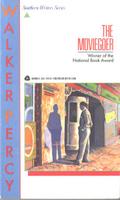Jack Bolling, aka Binx, loves the movies, and thinks movie stars are surrounded by more reality than ordinary people. He likes going to theaters in different neighborhoods, and always has to anchor himself in a specific place by getting to know the theater owner or the ticket lady. One of his greatest fears is becoming an Anyone, and living in an Anywhere. He doesn’t go to that many movies in the course of the book, but for Binx being a moviegoer is more of an attitude, because when he meets a romantic young man on a bus, he thinks of him: "He is a moviegoer, though of course he does not go to movies."
Binx is an odd character. His aunt begins to understand him when she tells him,
Your discovery, as best as I can determine, is that there is an alternative which no one has hit upon. It is that one finding oneself in one of life’s critical situatiosns need not after all respond in one of the traditional ways. No. One may simply default. Pass. Do as one pleases, shrug, turn on one’s heel and leave.In spite of this, Binx has a certain wisdom. Now and then he mentions his idea of search, and while he is cagey about naming or labeling what exactly he is searching for, he notes that "the polls report that 98% of Americans believe in God and the reamining 2% are atheists and agnostics-- which leaves not a single percentage point for a seeker." At another time, he notes that it is better to be "selfish" in conversations-- that is, to ask people about their work or lives because you are genuinely interested in it, rather than simply to be nice.
Binx's refusal to subside into an Anyone in an Anywhere is most evident in his need to get a sense of places. When he travels to Chicago, as soon as he steps off the train, before he can go anywhere, he must get the scent of the place.
Nobody but a Southerner knows the wrenching rinsing sadness of the cities of the North. Knowing all about genie-souls and living in haunted places like Shiloh and the Wilderness and Vicksburg and Atlanta where the ghosts of heroes walk abroad by day and are more real than people, he knows a ghost when he sees one, and no sooner does he step off the train in New York or Chicago or San Francisco than he feels the genie-soul perched on his shoulder.
There was a moment early on that resonated for me, and confirmed the fact of Binx as a moviegoer-- he is on a bus and catches the eye of a pretty girl. He knows that nothing will come of it, but thinks that if it were a movie, some disaster would strike and they would be thrown together. He comments early on that the movies are onto the search he has undertaken, but that they always mess it up. And the ending is ambiguous as to Binx's own success; he says something about abandoning his search, but he seems at least to have moved somewhere beyond where he started.
| Title: | The Moviegoer |
|---|---|
| Author: | Walker Percy |
| Date published: | 1960 |
| Genre: | Fiction |
| Number of pages: | 191 |



0 comments:
Post a Comment